Atlas Shrugged: Part I Blu-ray Movie
HomeAtlas Shrugged: Part I Blu-ray Movie 
20th Century Fox | 2011 | 97 min | Rated PG-13 | Nov 08, 2011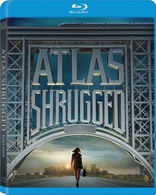
Movie rating
5.7 | / 10 |
Blu-ray rating
| Users | 4.4 | |
| Reviewer | 1.5 | |
| Overall | 3.7 |
Overview
Atlas Shrugged: Part I (2011)
It was great to be alive, once, but the world was perishing. Factories were shutting down, transportation was grinding to a halt, granaries were empty--and key people who had once kept it running were disappearing all over the country. As the lights winked out and the cities went cold, nothing was left to anyone but misery. No one knew how to stop it, no one understood why it was happening - except one woman, the operating executive of a once mighty transcontinental railroad, who suspects the answer may rest with a remarkable invention and the man who created it - a man who once said he would stop the motor of the world. Everything now depends on finding him and discovering the answer to the question on the lips of everyone as they whisper it in fear: Who *is* John Galt?
Starring: Taylor Schilling, Grant Bowler, Edi Gathegi, Michael O'Keefe, Navid NegahbanDirector: Paul Johansson
| Sci-Fi | Uncertain |
| Drama | Uncertain |
| Mystery | Uncertain |
Specifications
Video
Video codec: MPEG-4 AVC
Video resolution: 1080p
Aspect ratio: 2.35:1
Original aspect ratio: 2.39:1
Audio
English: DTS-HD Master Audio 5.1
Subtitles
English SDH, Spanish
Discs
50GB Blu-ray Disc
Single disc (1 BD)
Playback
Region A (locked)
Review
Rating summary
| Movie | 1.5 | |
| Video | 3.5 | |
| Audio | 3.5 | |
| Extras | 2.0 | |
| Overall | 1.5 |
Atlas Shrugged: Part I Blu-ray Movie Review
Who is John Galt? Who cares?
Reviewed by Casey Broadwater November 9, 2011The long-in-the-making Atlas Shrugged: Part I, the film version of the first third of novelist Ayn Rand’s politicizing magnum opus, has arrived
just in time to coincide with the Tea Party’s newfound and sometimes paradoxical obsession with Rand’s objectivist, “rational self-interest” philosophy.
The loudest voices on the political right—who are also unassailably aligned with religious conservatives—have co-opted Rand’s pro-unfettered capitalism
views, all the while conveniently dismissing the fact that Rand was a fiercely anti-church atheist who believed, as she put it in her book For the
New Intellectual, that all religion amounted to “a protection racket…making life on earth unbearable, then charging you for consolation and
relief.”
Conservatives have essentially cherry-picked from Rand’s novel what they want to hear and already believe—namely, that “job-creators” are the
defining beneficial force of society, that government regulation and unions are evils to rally against, and that laissez-faire, totally free-market capitalism
is the only economic system capable of protecting and nurturing an individual’s rights. Right-leaning Washington Times columnist Scott Galupo
even puts it this way: “Conservatives’ embrace of “Atlas Shrugged” today is nothing more than blinkered escapist fantasy—rather like a besieged army
turning to Norse mythology or J.R.R. Tolkien to boost morale.” Yet I strongly doubt anyone’s morale will be boosted by Atlas Shrugged: Part I,
a depressingly low-rent adaptation that’s stilted and poorly scripted and completely devoid of entertainment value. Even the most rabid objectivist
should be objective enough to see that this film has to be shrugged off as worthless.
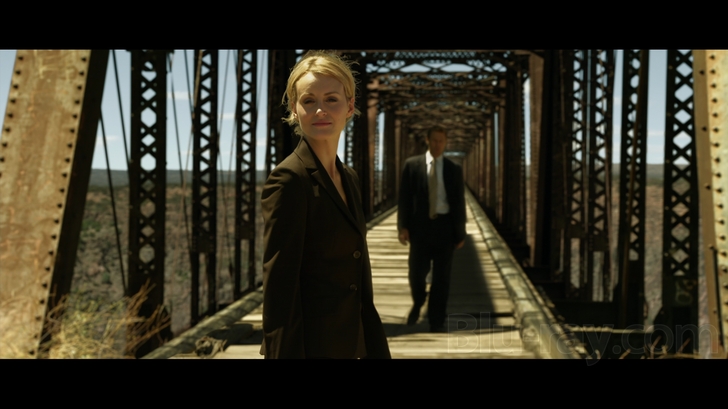
Dagny Taggart
As the first entry in a planned trilogy that may or may not ever be completed, Atlas Shrugged: Part I is a pared and stripped-down retelling of the novel’s first section, although it somehow manages to feel simultaneously bare-boned and bloated. The timeless, vaguely mid-20th century setting of the book has been changed to the not-so-distant future, 2016, in a dystopian, economically depressed America that’s been wracked by oil and natural gas shortages. Look carefully in the opening montage and you may spot a picketer holding an anti-Obama sign. This is a film that knows exactly to whom it’s catering.
With the price of gasoline skyrocketing to $40/gallon, railroads have reemerged as the only affordable means of long-distance transportation for both people and cargo, and Taggart Transcontinental—the last of the great rail companies—is dealing with the political fallout after a major accident on one of their lines. CEO James Taggart (Matthew Marsden) is a take-no-responsibility weakling who yields to pressure from Washington, but his tough-as-nails-sister, Dagny (Taylor Schilling)—the VP of Operations and the film’s protagonist—has taken charge and decided to refinish the Rio Norte line with tracks made from Rearden Metal, a miracle composite created by strong-willed industrialist Hank Rearden (Grant Bowler). The U.S government and steel lobbyists recognize that the lighter, stronger Rearden Metal is a clear advance in metallurgy, but they unjustly deem it dangerous so as to preserve “equality” in the industry. Naturally, the railroad engineers union follows suite and refuses to drive on tracks made from the unproven metal matrix. I think we’re entirely clear here, but just to reiterate the film’s message—industry good, government bad, business owners good, unions bad. Categorically.
And that’s about the gist of it, although—like Rand in her writing—the film, written by Brian Patrick O’Toole, overindulges in needlessly long objectivism-espousing dialogues written in the kind of high, didactic language that nobody would ever use in real life. (“What’s with these stupid altruistic urges,” Dagny says. “It’s not charitable or fair.”) The embodiment of these self-interested ideals is the shadowy John Galt—quite literally, we only see him in silhouette—who seems to be recruiting the best and brightest business minds to join him in a strike, to prove once and for all that society’s success is predicated on the unregulated freedom of its “productive” citizens. Galt is the story’s enigma, a near-mythological figure whose name is on everyone’s lips, even though he has no public face. Like a Jeopardy answer, people repeatedly phrase his name in the form of a question—“Who is John Galt?”—and the statement becomes the standard sarcastic reply to any situation that has no readily discernable solution. For example, if you were to ask me how Atlas Shrugged: Part I came to be so immeasurably awful, I might rightfully respond, “Who is John Galt?” Who knows? Who cares? What can be done?
Setting aside any philosophical/political opinions you may have before going into it, Atlas Shrugged really is a lousy film. It’s main offense is that it seems to forget that it’s a movie—intended primarily to entertain—and not just a vehicle for delivering an ideological point. It’s basically a 97-minute advertisement for objectivist economic theory, which—let’s face it—isn’t the most exciting way to spend a Saturday night, even if you’re a diehard Randian. Most of the film consists of filthy rich characters sitting in plush rooms having awkwardly worded conversations about how the industrious business class is being stilted by regulation and fed upon by the parasitic non-contributors of society. You might say this is a film for the 1%. It’s tiring in its pseudo-profound wordiness and non-stop sloganeering. (“You’d be surprised how quickly things get done when you do some actual work and stop relying on political favors.”) A tepid love entanglement between Dagny and the married Hank Rearden is the film’s sole concession to interpersonal drama, and the sex scene between the two is unsurprisingly chaste, presumably in order to avoid upsetting the delicate moral constitutions of the conservative target audience.
What will be most disappointing to fans of the book is how cheap the movie feels, especially for a film that purports to champion the virtues of well-used wealth. The scope and grandeur that the novel demands just isn’t here. The sets and CGI have a bargain-basement quality. The digital video cinematography and flat lighting screams “straight-to-video.” The acting is hindered by the mouthy, unnatural wording of the script. More than anything, Atlas Shrugged: Part I reminded me of Left Behind and The Omega Code, similarly low-budget, ideologically pointed films that preach only to the choir and convince only the already-converted.
Atlas Shrugged: Part I Blu-ray Movie, Video Quality 
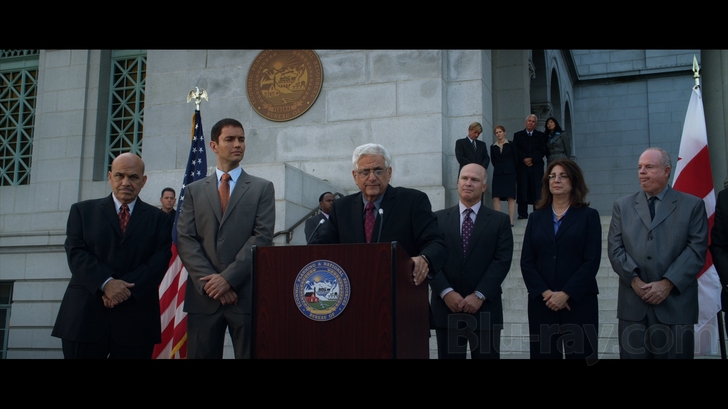
Atlas Shrugged: Part I was shot digitally with the very capable Red One camera, but there's more to cinematography than just the source format. The film's rather bland, sometimes overly bright lighting gives it the cheap look of a made-for-TV movie. Still, technically, there's not much wrong with the 1080p/AVC-encoded transfer presented here. Video noise is visible in darker scenes but kept to a minimum, there are no halo-ish byproducts of edge enhancement, no DNR smearing, and no blatant compression-related issues. This is a solid encode. You can't complain about clarity, either. While there are certainly a few soft shots, most scenes are more than adequately sharp, with fine high definition detail easily visible in facial texture, hair definition, and other areas where you normally look for it. Color is generally bold, warm, and well-saturated too, but the flat lighting really isn't doing the film any favors. The picture rarely looks appropriately cinematic. Black levels can crush shadow detail at times—especially in dark interiors —but contrast during outdoor and daylight scenes is spot on. This isn't exactly eye candy, but I can't fault the encode for the film's chintzy cinematography and set design.
Atlas Shrugged: Part I Blu-ray Movie, Audio Quality 
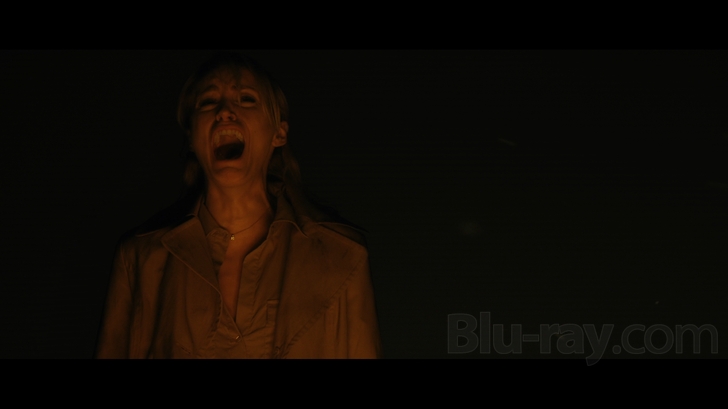
Similarly, the modestly-budgeted movie features expectedly underwhelming sound design, although it all comes through decently enough via a lossless DTS-HD Master Audio 5.1 surround track. Most of the time, the soundfield feels decidedly empty and front-heavy, with little environmental ambience and few cross-channels effects beyond the occasional zipping to and fro of the Taggart Transcontinental trains. The rear speakers really only get used for the swelling of the film's orchestral score, which veers between ominous and triumphant and sounds fairly rich, with good bass response and clarity throughout the range. There are a few instances where dialogue takes on a slightly hollow quality, but it's usually clear and full and easy to understand. I didn't notice a low-volume hiss in the surround channels from time to time—only when I really made an effort to listen for it—but there are no dropouts, crackles, or other unacceptable audio traits. Overall, the mix is acceptable but never remotely impressive.
Atlas Shrugged: Part I Blu-ray Movie, Special Features and Extras 
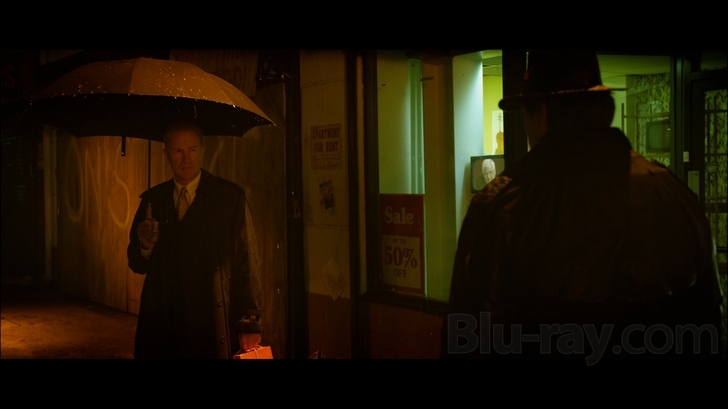
- Audio Commentary: Producers John Aglialoro and Harmon Kaslow, along with writer Brian Patrick O'Toole, give a reasonably informative blow by blow account of how the film came together. Whether you'll want to watch the movie a second time in order to hear the track, however, is another matter altogether.
- Road to Atlas Shrugged (1080p, 5:13): Executive producer John Aglialoro gives a brief background to Ayn Rand and Objectivism and discusses the process of obtaining the rights to the novel and producing the film.
- I Am John Galt (SD, 35:11): The film's online marketer came up with the idea to have Ayn Rand fans film themselves saying "I am John Galt" and post it to the movie's YouTube page. Edited together, the result is this half-hour montage, which gets to be creepy and kind of fascistic when you start to see little kids saying the phrase. Think of this as an anti-"I Am the 99%" campaign.
- The John Galt Theme Slideshow (SD, 3:39): Stills from the film set to the main theme of the score.
Atlas Shrugged: Part I Blu-ray Movie, Overall Score and Recommendation 
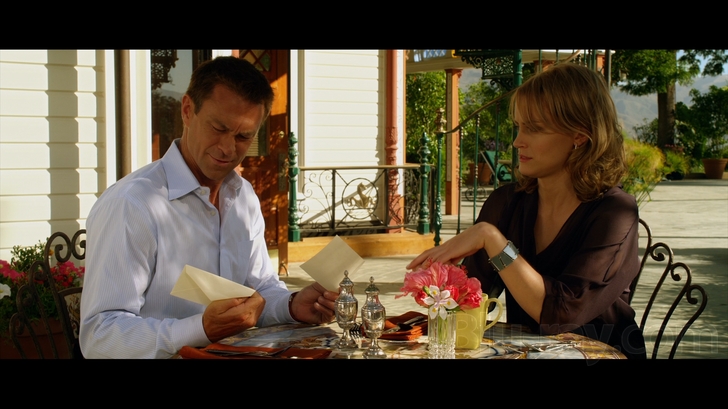
This film version of Atlas Shrugged has gotten some traction on talk radio and within fiscally conservative circles—the target audience—but unless you're completely blinded by ideology it's plain to see that the movie is constructed more poorly than a sweatshop t-shirt. It's all-around bad, a cheapo adaptation that fails to entertain, let alone—judging by the movie's box office numbers—achieve its goal of spreading Ayn Rand's views on economics and individual rights to a larger audience. Unless you're some kind of tri-cornered hat-wearing, picket sign-toting Tea Partier who will love the film no matter what, you should probably avoid Part I at all costs. The producers say the next two installments in the trilogy are still coming, but I'll believe it when I see it.
Similar titles
Similar titles you might also like

Atlas Shrugged: Part II - The Strike
2012

Atlas Shrugged Part III: Who Is John Galt?
2014

Fahrenheit 451
2018

The Expanse: The Complete Series
2015-2022

Arrival 4K
2016

Westworld: The Complete Series
2016-2022

Contact
1997

Fringe: The Complete Series
2008-2013

V: The Complete Second Season
2011

Blake's 7: The Collection - Series 2
1979

THX 1138
The George Lucas Director's Cut
1971

Rememory
2017

Firefly: The Complete Series
15th Anniversary Edition
2002

Dollhouse: Season 2
2010

Riverworld
2010

Galactica 1980: Full Frame
Definitive Edition
1980

Voyagers
2021

Ad Astra
2019

Gemini Man 4K
2019

The Creator 4K
2023
